 1 citations,
February 2020 in “Journal of Cosmetic Dermatology”
1 citations,
February 2020 in “Journal of Cosmetic Dermatology” Hair transplant surgery reduces scalp sensitivity by almost 40%, and smokers have less scalp sensitivity than non-smokers. The time since surgery doesn't significantly affect this.
 1 citations,
April 2022 in “Journal of The American Academy of Dermatology”
1 citations,
April 2022 in “Journal of The American Academy of Dermatology” Hair loss in men (androgenetic alopecia) is significantly linked to decreased scalp sensitivity, but not temperature sensitivity. More research is needed to confirm this. Comparing this hair loss to leprosy is unsupported and stigmatizing.
 80 citations,
March 2008 in “Contact Dermatitis”
80 citations,
March 2008 in “Contact Dermatitis” Nearly half of the French individuals surveyed reported having a sensitive scalp, more common in women, often linked to hair loss and symptoms like itching, and triggered by factors including shampoos and pollution.
 53 citations,
January 2007 in “Dermatology”
53 citations,
January 2007 in “Dermatology” Chemotherapy often causes patterned hair loss, with some scalp areas more resistant to hair loss than others.
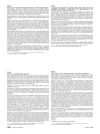 January 2008 in “Journal of The American Academy of Dermatology”
January 2008 in “Journal of The American Academy of Dermatology” Hair loss affects 20% of people, more in men and those over 35, and is often associated with a sensitive scalp.
 3 citations,
June 2022 in “Plastic & Reconstructive Surgery”
3 citations,
June 2022 in “Plastic & Reconstructive Surgery” Both endoscopic and pretrichial open forehead lifts effectively elevate eyebrows long-term with high patient satisfaction.
 May 2023 in “International Journal of Trichology”
May 2023 in “International Journal of Trichology” A witch-hazel-based 5% minoxidil solution is effective and safe for women with hair loss who didn't respond to regular minoxidil, especially if they're sensitive to propylene glycol.
 37 citations,
June 2021 in “Journal of the European Academy of Dermatology and Venereology”
37 citations,
June 2021 in “Journal of the European Academy of Dermatology and Venereology” Adult skin quickly reacts to short-term environmental and internal stress, leading to various skin issues and the need for protective measures.
 11 citations,
January 2014 in “International Journal of Trichology”
11 citations,
January 2014 in “International Journal of Trichology” Witch hazel-based hair products improved scalp irritation and were well-tolerated.
 4 citations,
January 2021 in “Skin appendage disorders”
4 citations,
January 2021 in “Skin appendage disorders” Washing hair daily is better and preferred, with no negative effects.
 June 2023 in “Hanguk ingeurie hakoeji”
June 2023 in “Hanguk ingeurie hakoeji” Eating fermented protein made from black bean powder twice a day for 60 days improved hair density but not scalp condition or hair thickness.
 September 2019 in “Journal of Investigative Dermatology”
September 2019 in “Journal of Investigative Dermatology” Botanical extracts from peas and chia seeds improved scalp health and protected hair from pollution.
 April 2020 in “Dermatology and therapy”
April 2020 in “Dermatology and therapy” New 5% minoxidil solution improves scalp hydration, reduces redness, and may be safer for sensitive users.
 159 citations,
September 2001 in “European Journal of Cancer Care”
159 citations,
September 2001 in “European Journal of Cancer Care” Chemotherapy-induced hair loss significantly affects patients' well-being, and nurses are key in helping them cope, but more research is needed to find effective treatments.
 January 2024 in “Journal of Pharmacognosy and Phytochemistry”
January 2024 in “Journal of Pharmacognosy and Phytochemistry” Rosemary hair serum promotes healthier, stronger, and shinier hair.
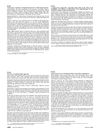 January 2008 in “Journal of The American Academy of Dermatology”
January 2008 in “Journal of The American Academy of Dermatology” Trichoscopy is a helpful and quick method to identify different types of hair loss in women.
 108 citations,
January 2003 in “Fertility and Sterility”
108 citations,
January 2003 in “Fertility and Sterility” Flutamide may slightly improve hair loss in women, but finasteride does not work.
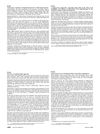 January 2008 in “Journal of The American Academy of Dermatology”
January 2008 in “Journal of The American Academy of Dermatology” A nonchemical lotion was found effective in killing head lice and their eggs in most people, indicating it could be useful for managing head lice.
January 2023 in “International Journal of Trichology” Alcohol-free minoxidil is better for treating hair loss in Indian men.
 57 citations,
January 2004 in “Journal of Endocrinology”
57 citations,
January 2004 in “Journal of Endocrinology” Baldness caused by male hormones in female-to-male transsexuals doesn't increase the risk of heart disease.
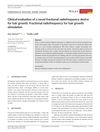 9 citations,
January 2018 in “Dermatologic Therapy”
9 citations,
January 2018 in “Dermatologic Therapy” The HairLux device safely and effectively promotes hair growth in people with hair loss.
 4 citations,
August 2018 in “Facial Plastic Surgery Clinics of North America”
4 citations,
August 2018 in “Facial Plastic Surgery Clinics of North America” Platelet-Rich Plasma (PRP), a protein-rich extract from a patient's blood, shows promise in improving hair density, thickness, and quality, but the best method of use and number of treatments needed for noticeable results are still unclear.
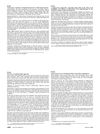 2 citations,
January 2008 in “Journal of The American Academy of Dermatology”
2 citations,
January 2008 in “Journal of The American Academy of Dermatology” Trichoscopy is a helpful and quick method to diagnose hair loss without shaving.
 May 2017 in “InTech eBooks”
May 2017 in “InTech eBooks” Some hair loss disorders cause permanent loss due to scarring, and treatments like steroids don't always work well.
 164 citations,
January 2014 in “Journal of Cutaneous and Aesthetic Surgery”
164 citations,
January 2014 in “Journal of Cutaneous and Aesthetic Surgery” PRP injections increase hair density and satisfaction in androgenetic alopecia patients.
 105 citations,
January 2009 in “Medicine”
105 citations,
January 2009 in “Medicine” Hirsutism is more linked to high androgen levels than acne or hair loss, and a mix of hormonal tests is best for diagnosis; certain treatments can reduce symptoms.
 45 citations,
August 2019 in “Dermatologic Therapy”
45 citations,
August 2019 in “Dermatologic Therapy” Hair loss treatments work better with lifestyle changes.
 33 citations,
July 2020 in “Journal of The American Academy of Dermatology”
33 citations,
July 2020 in “Journal of The American Academy of Dermatology” PRP treatment improves hair density and thickness for alopecia, but needs more research.
 29 citations,
November 2013 in “Expert Review of Dermatology”
29 citations,
November 2013 in “Expert Review of Dermatology” Sensitive skin often causes discomfort, affects many people, especially women and older adults, and should be managed with careful product selection.
 18 citations,
November 2016 in “Journal of Oral and Maxillofacial Surgery”
18 citations,
November 2016 in “Journal of Oral and Maxillofacial Surgery” Platelet-Rich Plasma (PRP) treatment can potentially increase hair density and quality in people with hair loss, but more research is needed to confirm its effectiveness.





























